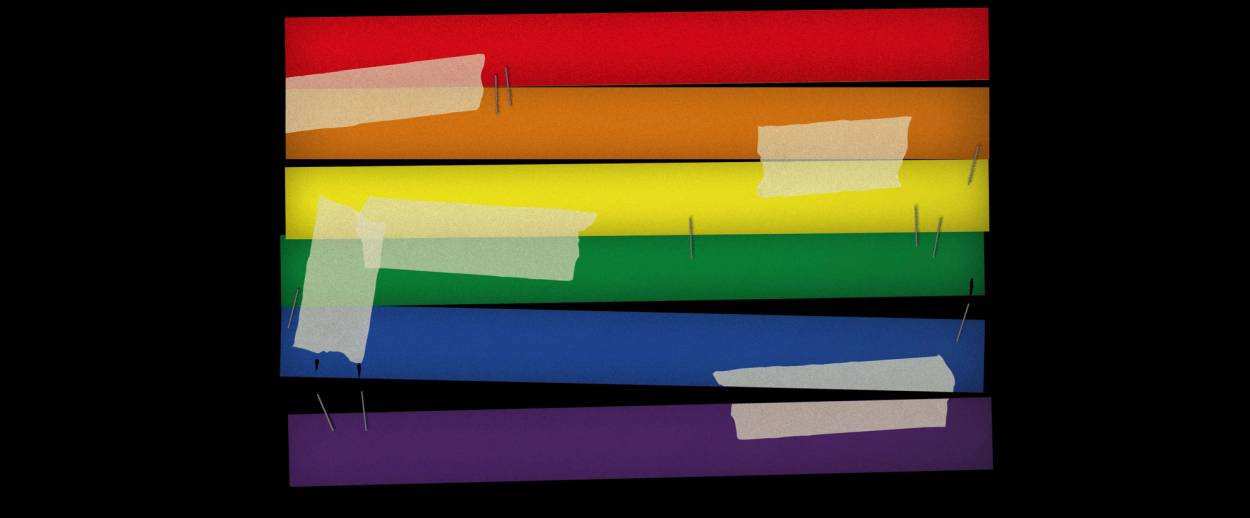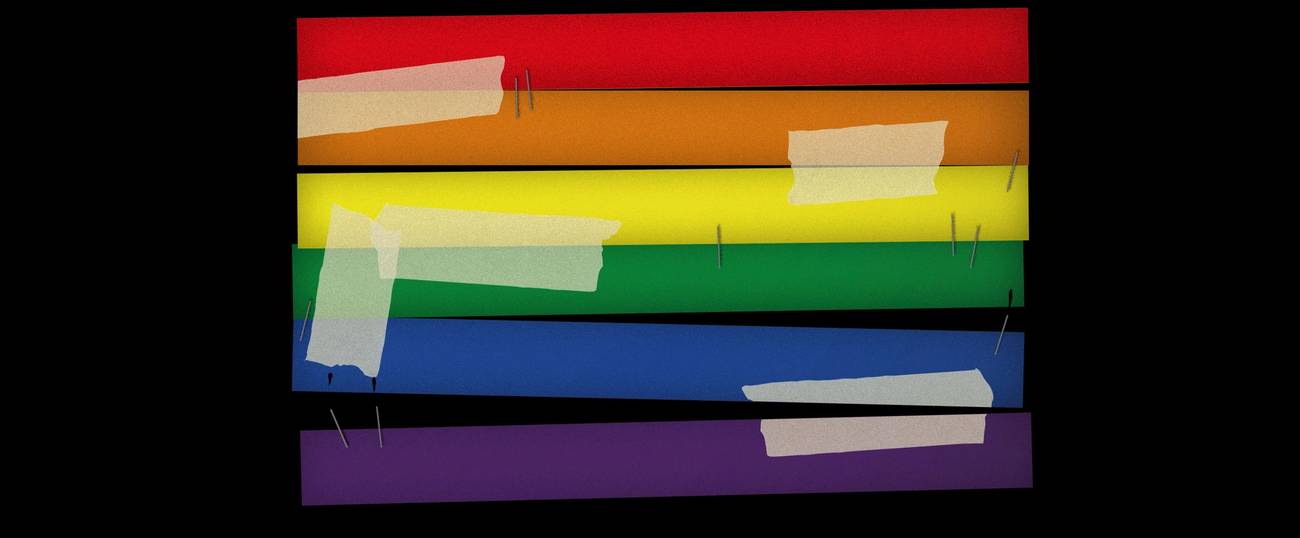As I write this, ISIS is hunting gay men to toss from the rooftops of Raqaa, and nearly 80 countries proscribe homosexuality. Yet for a 36-hour period earlier this week, the National LGBTQ Task Force chose to ally itself not with the one country in the Middle East that guarantees and protects the human rights of LGBTQ people, but with those who hang them from construction cranes.
On Sunday, the Task Force announced that it had canceled a post-Shabbat service reception at its annual Creating Change conference organized by the San Francisco-based nonprofit A Wider Bridge, which builds connections between LGBT communities in North America and Israel. Headlining the evening were representatives from Jerusalem Open House, an LGBT community center that serves a diverse array of constituencies, Palestinians and Israeli Arabs among them. Caving to pressure from a handful of anti-Israel extremists, the Task Force withdrew its sponsorship and kicked A Wider Bridge off its program.
“We canceled the reception when it became clear to us it would be intensely divisive rather than the community-building, social atmosphere which is the norm for Friday night at the conference,” Task Force Executive Director Rea Carey said in an emailed statement. Tyler Gregory, Deputy Director of A Wider Bridge, told the Washington Blade that the Task Force “recommended we either cancel [the] event, or ensure that our event speakers condemn the Israeli government in their remarks,” though which aspects of Israel’s government the Task Force expected A Wider Bridge—which receives no Israeli government funding—to “condemn” were left vague. Refusing to comply with either demand, A Wider Bridge was forced to move its event to a different hotel.
Carey’s contention that the happening—announced months ago—would be “intensely divisive” appears to rest on complaints registered by just three people: Dean Spade, a transgender professor at the Seattle University School of Law and a self-described “trans south Asian performance art duo” named Dark Matter. These, at least, were the only individuals named in the Blade story as having made public statements egging on the Task Force to engage in what is effectively an act of anti-Semitic prejudice and segregation.
And let there be no confusion: A non-compulsory Shabbat dinner and discussion of the Israeli LGBT experience is “divisive” in the way that the presence of a gay man in a locker room is “divisive.” It only “offends” the sensibilities of bigots. When a white person refuses to sit at a lunch counter next to a black person, or a straight football player refuses to play alongside a gay one, we have a word for that: discrimination. Nonetheless, a group ostensibly committed to fighting discrimination and that holds a conference so inclusive of the world’s many diversities that it provides “scent-free” areas for individuals highly sensitive to smell, bowed to those wanting to make it Jew-free as well.
Fortunately, after complaints by grassroots activists and high-profile gay Jews like Congressman Jared Polis and Robbie Kaplan, the lawyer who successfully argued the landmark marriage equality case United States vs. Windsor, the Task Force came to its senses, and announced Tuesday morning that it had reversed its decision to cancel the Israel-themed evening. What she had just hours earlier described as an “intensely divisive” program, Carey now says is integral to “our core value of inclusion.”
This is an edifying moment for gays, Jews, and the broader left. Were they to let this act of blatant discrimination stand, the leaders of the Task Force would have betrayed all these communities by succumbing to the heckler’s veto. In the loftier precincts of progressive journalism, higher education, and the non-profit world, those hecklers tend to be proponents of “intersectionality,” a voguish theory purporting that power is inextricably linked to aspects of identity like race, gender, religion, and sexual orientation, and that an individual’s “marginalization” is thus determined by their accumulation of various traits. Across the country, pseudo-intellectual totalitarians posing as outcasts regularly intimidate earnest but spineless liberals into capitulation. From the Oscar red carpet to Yale University quads, whoever shouts the loudest and claims victimization on account of more facets of their identity can expect to get what they demand, regardless of the quality or even logic of what they have to say.
Proponents of intersectionality have elevated its categorical paradigms of all-encompassing, omnipresent “oppression,” and its attendant, identity-based hierarchies of virtue, to that of a Weltanschauung, a new morality to replace the basic, classical liberal principles of freedom, individual rights, and equality before the law on which Western civilization is based. Because of intersectionality’s insistence that identity politics trumps all, reflexive condemnation replaces reasoned discussion, and those claiming to represent a higher good smother the rights of individuals. Likewise, intersectionality compels one to adopt agendas that have nothing to do with his or her own. Worse, in the name of “solidarity” with other supposedly “oppressed” groups, it leads to alliances with those actively hostile to one’s cause. This is how a gay rights organization led by well-meaning progressives can be duped into disinviting private citizens of the one country in the Middle East respecting the humanity of gays, all at the behest of people who use cultural relativism to excuse Muslim societies that throw homosexuals from the tops of buildings. Denouncing A Wider Bridge as an “Israel advocacy organization,” Spade accused it of promoting a “regime producing colonization and genocide,” a morally scandalous statement not just for its tacit comparison of Jews to Nazis, but also its deliberate elision of the very real genocides taking place in nearby Islamic lands. In a world of people who want to murder them for being Jewish, denying the rights of Jews—and Jews alone—to live their own national life is a moral evil no different than targeting LGBT people or anyone else for being who they are—and that would be true even if Israel wasn’t the sole bastion of LGBT rights in the Middle East.
Accepting the tenets of intersectionality inevitably lets the most radical and unscrupulous elements of any community badger and threaten their way to the top. Within progressive institutions, battles over anti-Israel boycotts are unfortunately a dime a dozen these days, but what makes this one particularly noteworthy was how quickly the Task Force’s leadership folded in response to a professor at a third rate law school and a pair of androgynous poets with a Twitter account. Dean Spade, the chief instigator of the controversy, is a negligible figure even within the already rarefied world of transgender activism where he fashions himself a heavyweight. Like the CUNY Staten Island Professor Sarah Schulman, he frequently places himself at the center of disputes over “pinkwashing,” the supposed Zionist plot by which Israel’s respect for LGBT people serves as a smokescreen for oppression of the Palestinians. In addition to his work shutting down traditional Jewish Sabbath events, Spade is co-author of a statement declaring that “the same-sex marriage battle has been part of a conservative gay politics that de-prioritizes people of color, poor people, trans people, women, immigrants, prisoners and people with disabilities,” the sort of assertion that might strike some graduate students on a Queer Theory email list as profound but has absolutely no resonance with the vast majority of Americans, gay, straight or anything in between. Spade possesses an important talent, however, which is that he can effectively speak the language of intersectionality to audiences primed to accept its bullshit precepts, as the Task Force’s initial acquiescence to his bullying behavior indicates. The only reason he didn’t succeed is because his adversaries, A Wider Bridge and its many friends in the LGBT and allied community, were vigilant, unapologetic about what they believed, and too numerous to ignore.
Herein lies an important lesson for Jews. Before gays could win the legal argument for equality, they had to win the cultural one. They did so by standing up for themselves, speaking honestly about their lives and calling out those who defamed them. Today in America, open expressions of homophobia are by and large socially unacceptable. Politicians who still oppose gay marriage, for instance, almost always do so on grounds of “protecting” a cherished institution from change rather than by demonizing gay people as disease-ridden deviants, as they used to do not long ago. While I believe that the effort to stamp out homophobic attitudes can sometimes be overzealous and pointless (do we really need every hillbilly baker to express approval of gay nuptials under threat of legal action?), there is no question that the dramatic shift in American culture on the question of homosexuality has been for the better.
Jews have the same responsibility and must use the same tools that LGBT people use to assert their own humanity and defend their human rights. It’s long past time for Jews to break the silence about institutions and political actors that say the Jewish people alone in the world have no right to national self-determination, or that the murder of Jews—in Israel, in the West Bank, in Paris—is somehow different than murdering anyone else because of the alleged crimes of the Israeli government.
Can that be uncomfortable? Yes. But so can telling your drunk uncle to cool it on the fag jokes at Thanksgiving. For generations, fear kept (and in far too many places, still keeps) gays “in their place,” at immeasurable human cost. Now it’s keeping Jews “in their place”—ironically, on the progressive left, where they long to feel at home. But being at home isn’t always easy, as Jews can learn from their LGBT brothers and sisters. A Wider Bridge’s triumph over the bigots is a watershed victory in that struggle for the heart and soul of the American left.
To read more of James Kirchick’s cultural criticism for Tablet magazine, click here.

